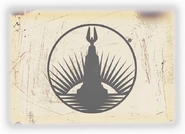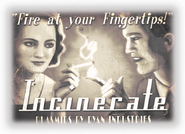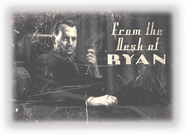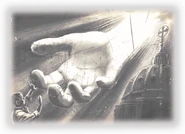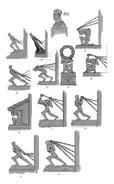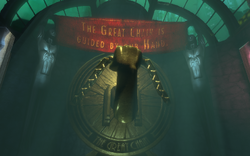
"The Great Chain is guided by our hand."
- “I believe in no God, no invisible man in the sky. But there is something more powerful than each of us, a combination of our efforts: a Great Chain of industry that unites us. But it is only when we struggle in our own interest that the chain pulls society in the right direction. The chain is too powerful and too mysterious for any government to guide. Any man who tells you different either has his hand in your pocket, or a pistol to your neck.”
- ― Andrew Ryan[src]
The Great Chain is an allegorical term coined by Andrew Ryan to describe his view of the market and its evolution, especially within Rapture. According to his ideal, each worker and consumer influences the economy through his or her natural endeavors to produce, buy and sell. The combined actions of all participants in the economy create a relatively unified movement, thus every individual is a "link" in this Great Chain of industry, pulling it upward simply by acting in their own self-interest.
Principle[]
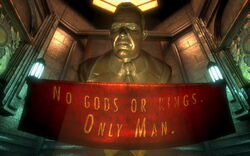
No institution could control the individual.
According to Andrew Ryan's vision, the Great Chain must be guided solely by individuals working for their own interest, which can only occur in a free market system. In an unrestricted economy, the Great Chain would obey only the laws of exchange: pricing and distribution, supply and demand. Because of this, Ryan despised government, since he saw no place for it in a society of open trade. Government, according to Ryan, was a hindrance to an economy's freedom and served only to leech resources away from it while forcefully depriving its participants of the fruits of their labor. In Ryan's early vision, no single individual or entity had the right to control the Great Chain: the freedom of the people rested on the freedom of the Chain, and to control it would equate to tyranny.
History within Rapture[]
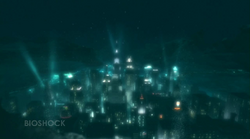
Rapture: A dystopian society with a unique, libertarian capitalist economy.
- “Something must be done about Fontaine. While I was buying buildings and fish futures, he was cornering the market on genotypes and nucleotide sequences. Rapture is transforming before my eyes. The Great Chain is pulling away from me. Perhaps it's time to give it a tug…”
- ― Andrew Ryan[src]
For a time, Ryan's ideals held true. Free from all economic and ethical restrictions, Rapture became a place of innovation and entrepreneurship. Technology decades or even centuries ahead of the surface world's became commonplace in the city, and seemingly impossible wonders such as a geothermal power station, a self-sustaining biosphere and a gene-based supercomputer became reality. In these early stages Rapture prospered, and the Great Chain held strong.
This was not to last, however. Ideals gave way to less idyllic business practices. Some businessmen ran their enterprises with a disregard for human life, while others profited through crime and extortion. Rapture's labor force, through the stress of economic downturns faced unemployment and a declining standard of living. A powerfully addictive substance seized the populace.
Ryan himself was forced to abandon some of his own ideals in his battle against Fontaine to save Rapture. Though initially willing to play by the rules he set himself, and with an assumption that required minimized city regulation, Ryan gradually resorted to more coercive tactics as he employed Sullivan and his security force to eliminate the threat of Fontaine's crime ring. After the latter's death, Ryan nationalized Fontaine Futuristics to maintain stability of the ADAM addicted population, betraying his own ideology, and the trust of his closest friend, Bill McDonagh.
As Andrew Ryan took on dictatorial powers, the Great Chain, already a shadow of its former shape, lost its purpose. Ryan gradually degenerated into what he hated most: a tyrant, personally driving the course of a largely shattered economy in the midst of a war. The Civil War with Atlas left a situation where Ryan's ideals were a liability: In the Rapture Bank Crash, the Rapture Dollar lost its worth as people scrambled to just survive the carnage. Monetary exchanges lost all meaning, so the city's crazed inhabitants (or Splicers) resorted to using ADAM (the source of all Plasmid and Gene Tonic related powers) for currency. As chaos increased, the city struggled to produce basic resources, as it was unsafe for citizens to even go to work, and many people resorted to theft and violence. In desperation, Ryan took control of the crazed populace - their very will, to end the fighting and destruction. With Ryan's death, the chances of Rapture again being run using its original ideals grew remote. Eroded by a calamitous environment it was not designed for, the Great Chain no longer functioned, instead giving way to the concept of collectivism, the antithesis to Ryan's ideals.
Gallery[]
Behind the Scenes[]
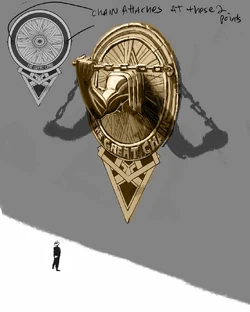
Concept art by Robb Waters.
- The Great Chain is a reference to the Invisible Hand of the Market, a theory belonging to Adam Smith (also known as the "Father of Capitalism").[1]
- Ryan's philosophy is that of Laissez-faire economics, a libertarian ideal in which market forces are unfettered by state intervention.
- The tattoos on Jack's wrists may be a reference to the Great Chain, as well as his apparent slavery. This could also be a nod to Atlas Shrugged, Ayn Rand's most famous novel, in which one of the main characters, Hank Rearden, creates a chain bracelet out of an alloy he invented as a symbol of his achievements.
- The Great Chain has been incorporated into some of Rapture's architecture and decoration. Columns in some districts of the city have the appearance of a giant chain, and the light sconces in Fontaine's Department Store depict a woman holding an orb wrapped in a chain.
- The Great Chain monuments seen in Rapture were designed by Robb Waters.[2]
- Kat Berkley also designed a great chain monument for Burial at Sea - Episode 1 (seen in the gallery beneath), which didn't make it past the drawing board.[3]



